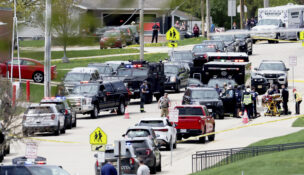High court to hold public hearing on revisions to class-action statute
By: Erika Strebel, [email protected]//October 20, 2017//
High court to hold public hearing on revisions to class-action statute
By: Erika Strebel, [email protected]//October 20, 2017//

The Wisconsin Supreme Court will be hearing testimony on a proposal to repeal the state’s statute governing class actions and replace it with language from the comparable federal rule.
The proposal was filed in March by the Wisconsin Judicial Council, a 21-member independent body made up of judges, lawyers and lawmakers who study and recommend changes to the state’s rules of procedure and evidence.
The current class-action rule, Wis. Stat. 803.08, has remained unchanged since the 1800s and is based on the 1849 Field Code. Rules of this sort have been under fire from scholars as far back as 1971. Only two other states, according to the council, have similar class-action rules.
The Federal Rules of Civil Procedure, for their part, were amended in 1938 to include Rule 23, which governs class-action lawsuits. Although Wisconsin adopted many of those changes 40 years ago, it chose not to revise its class-action rule, which has been refined over the years and contains detailed procedures governing certification, providing notice, appointing class counsel and handing down judgment.
Council to have first meeting since loss of staff, budget
The Wisconsin Judicial Council will be meeting this week for the first time since losing its budget and its staff.
The meeting will take place on Friday at the Wisconsin State Bar Center, 5302 East Park Blvd. in Madison.
The council plans to go into closed session near the beginning of the meeting to discuss various employment matters.
In its open session, the council will be discussing its pending petitions, which include one calling for change to the state’s class-action rule and one for change to the rules governing how parties in multi-party appeals file briefs.
The council will also discuss matters relating to its loss of budget and staff, and how it will go forward, including how often members will meet and how they will communicate without a staff attorney, an office and a budget.
In the state’s two latest budgets, lawmakers have not set aside money for the council. The Wisconsin Supreme Court, after the council recently voted to provide a raise to the council’s only employee, the staff attorney April Southwick, has also decided to stop footing the bill.
As a result, when Wisconsin judges need guidance on class-action procedures, they end up relying on federal case law.
Michael Fitzpatrick, who left the judicial council after having been elected to the Court of Appeals in the spring, has noted that the rule was of little help when, while serving as a circuit court judge in Rock County, he encountered a class-action lawsuit between Hormel Foods Corp. and its employees.
The justices discussed the council’s proposal at an open conference in April and voted to hear testimony from the public. In August, the court invited various groups to weigh in, including the University of Wisconsin Law School’s Consumer Law Clinic, the Wisconsin Chapter of the Association for Corporate Counsel and the Wisconsin Medical Society.
Then the court, at the end of its latest term, voted to send the matter to a public hearing. Since then, only one more group has weighed in. The Wisconsin Civil Justice Council, an organization of businesses and professional groups that works to promote fairness and equity in the state’s civil justice system, filed a letter in September in support of the proposal.
“Aligning Wisconsin’s class action statute with Rule 23 will add needed specificity, clarity and consistency not found in our current law,” the council wrote.
The planned public hearing on the proposal will take place at 9:30 a.m. Oct. 30 in the Supreme Court Hearing Room in the state Capitol.
Changes to evidence rules to take effect Jan. 1
The Wisconsin Supreme Court last week issued an order formally adopting several changes to the state’s rules of evidence.
The changes were proposed in 2016 by the Judicial Council, a 21-member body of practitioners and lawmakers, as a result of a years-long study done by its evidence and civil procedure committee.
Rather than adopt the changes, the court voted in January to return the proposal to the council for more revisions. The council amended the petition and filed the revised version in March. The court then voted in May to hold a hearing on the proposal.
The hearing took place in September. Shortly afterward, the court voted to adopt the changes in a closed conference.
The justices released an order on Oct. 11 making the following changes suggested by the council, all of which take effect Jan 1., 2018:
Changing Wisconsin’s rule for allowing past criminal convictions to be introduced to impeach witnesses, Wis. Stat. 906.09, so that it conforms to state case law and courtroom practice. The rule in its current form mirrors its federal counterpart, FRE 609, even though Wisconsin’s practices differ in two ways from what’s done in federal courts. Namely, Wisconsin does not put any limits on the type of criminal convictions that can be brought up and allows for no separate hearings in front a judge before trial.
Revising the state’s rule governing the impeachment of witnesses by introducing evidence of specific acts, Wis. Stat. 906.08, so it matches up with its federal counterpart, FRE 608, which was amended in 2003. The new rules replaces “credibility” with “character for truthfulness.”
Expand the state rule involving the admissibility of writings and recorded statements, Wis. Stat. 901.07, to include unwritten oral statements.
Adding Wis. Stat 906.16, which states that evidence of bias may be introduced to impeach a witness.
Legal News
- (Updated) Wisconsin law enforcement clash with pro-Palestinian Madison protestors
- Gov. Evers seeks applicants for Lafayette County Circuit Court
- Complaint against University filed by Wisconsin law firm over $1.9M given to Palestinian students
- Hush money trial judge raises threat of jail as he finds Trump violated gag order, fines him $9K
- Active shooter ‘neutralized’ outside Wisconsin middle school
- Audit finds Wisconsin Capitol Police emergency response times up, calls for better tracking
- Jury finds Wisconsin man sane in sexual assault, killing of toddler
- Attorney sentenced to 20 years in prison for sexually exploiting numerous children
- UW-Madison pro-Palestine protesters spark debate over free speech laws
- DEA to reclassify marijuana in a historic shift
- Wisconsin opens public comment on constitutional amendment regarding election officials
- Court upholds Milwaukee police officer’s firing for posting racist memes
WLJ People
- Power 30 Personal Injury Attorneys – Russell Nicolet
- Power 30 Personal Injury Attorneys – Benjamin Nicolet
- Power 30 Personal Injury Attorneys – Dustin T. Woehl
- Power 30 Personal Injury Attorneys – Katherine Metzger
- Power 30 Personal Injury Attorneys – Joseph Ryan
- Power 30 Personal Injury Attorneys – James M. Ryan
- Power 30 Personal Injury Attorneys – Dana Wachs
- Power 30 Personal Injury Attorneys – Mark L. Thomsen
- Power 30 Personal Injury Attorneys – Matthew Lein
- Power 30 Personal Injury Attorneys – Jeffrey A. Pitman
- Power 30 Personal Injury Attorneys – William Pemberton
- Power 30 Personal Injury Attorneys – Howard S. Sicula











